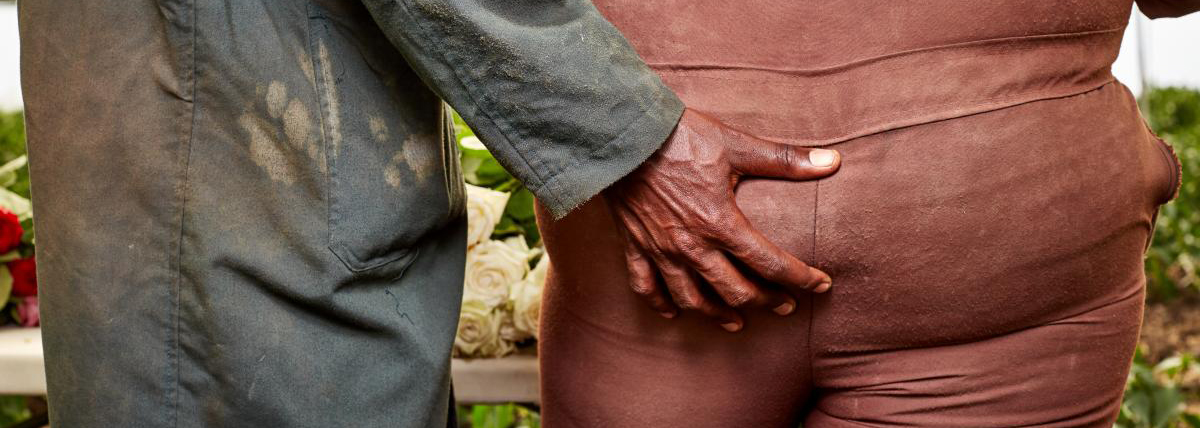Tackling sexual harassment in East African flower farms
“Do you like sex?” Eunice Waweru asks a group of women who work at a flower farm in Naivasha, Kenya. Everyone is shy and avoids eye contact with Eunice. “I like sex”, she says. This is Eunice’s way of starting a conversation on sexual harassment. She is in the farm to sensitize workers on the ever taboo subject of sexual harassment.
Eunice, a social worker and project manager at Workers Rights Watch, has been working with Hivos and other civil society organizations to tackle sexual harassment in flower farms in Kenya, Uganda, Tanzania and Ethiopia. In 2013, Workers Rights Watch (Kenya), Uganda Workers’ Education Association, the Tanzania Plantation and Agricultural Workers’ Union, and the National Federation of Farm, Plantation and Fisheries and Agro-Industries Trade Union (Ethiopia), conducted a baseline survey in twenty flower farms which revealed that sexual harassment at farms was common, yet widely unacknowledged.
Workers were not comfortable reporting incidences of sexual harassment. The majority of flower farms did not have workplace sexual harassment policies, even though national legislation required that they do, and those that did have these policies did not have effective and viable structures for implementing them. Committees (referred to as gender committees) tasked with addressing incidences of harassment did not have the technical capacity to address them. They also did not have the time and space to deliberate on matters brought before them. Besides, it was almost impossible for the gender committees, mostly composed of general workers, to determine matters relating to senior management and ensure the enforcement of their recommendations.
In a number of homes/labor catchment communities, sexual harassment was not seen as a significant social wrong. Thus, many women workers did not feel the need to report incidences, at the risk of backlash and losing their standing in society, even their marriage. Above all, there was a near universal lack of knowledge and understanding about the meaning, scope, effects and legally defined consequences of sexual harassment, both in the community and in the flower farms.
In 2015, the four organisations mentioned above, together with Hivos, engaged eight flower farms in a pilot project to adopt a sexual harassment policy that would then be scaled-up to the entire flower sector in Kenya. The foundational instrument was a model workplace sexual harassment policy whose main components are: Definition and scope of sexual harassment; Sanctions for violating the policy provisions; Measures required for implementing the policy; Workplace structures for implementing the policy.
Workers, supervisors and managers were made aware of the substantive scope of the policies as well as the broad context of sexual harassment and its effects. The gender committees in the respective farms were also trained on how to address matters reported to them as well as on mechanisms for preventing sexual harassment in the work place. Farm management had the ultimate responsibility of implementing the policy, while the gender committees and union committees at farm level were tasked with monitoring compliance with the policy.
However, from the pilot, it was evident that a lot more than the model policy and the training provided was needed to eliminate sexual harassment and its long-term implications on those affected. Some of these interventions would include involvement of trade unions in order to activate the adoption of the model policy elements at contract signing and where appropriate, within Collective Bargaining Agreements.
A second phase of the project (2017-2019) is ongoing in the four countries. In Kenya, the project has been endorsed by the export association the Kenya Flower Council and certification body Fairtrade International. The two bodies require that their members comply with standard indicators drawn from the project. This brings in the indirect commitment of at least 105 flower farms in Kenya.
Data compiled by Equal Rights Advocates, a women’s law center in the United States, states that 90-95 per cent of sexually harassed women suffer from some debilitating stress reaction, including anxiety, depression, headaches, sleep disorders, weight loss or gain, nausea, lowered self-esteem and sexual dysfunction. In addition, victims of sexual harassment lose $4.4 million dollars in wages and 973,000 hours in unpaid leave each year in the United States.
Generally, sexual harassment has a long term demoralizing effect that discourages women from asserting themselves within the workplace. It also objectifies women employees as sex objects and perpetuates a culture of abuse. Besides the primary victim, sexual harassment also has an effect on the morale of third parties and employees within range of it. Colleagues of the victim, for example, can find their work disrupted by sexual harassment, even where they are not directly involved.








